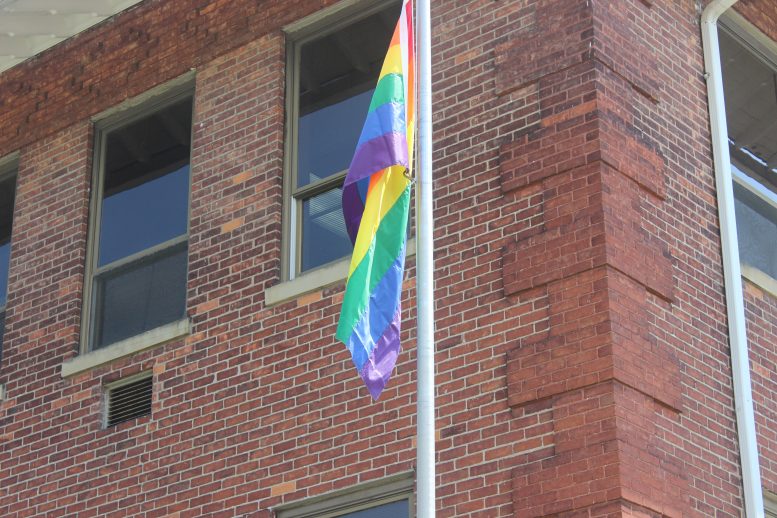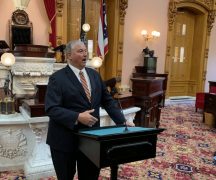By Susan Tebben
Several bills regarding sex and gender issues are being considered in the Ohio legislature, including a bill to prohibit transition-related medicine for transgender youth, a bill to make pornography a public health hazard, and one that aims to cease conversion therapy.
Transgender-related medicine
A bill still being drafted by state Rep. Ron Hood, R-Ashville, and state Rep. Bill Dean, R-Xenia, seeks to punish doctors who conduct hormone therapies and gender reassignment surgeries that transgender individuals have in order to align their bodies with the gender to which they identify. Called the “Protect Vulnerable Children Act,” this bill is targeted at procedures done to transgender youth.
Hood and Dean stood with Citizens for Community Values President Aaron Baer in a press conference recently to announce the upcoming proposal.
Citizens for Community Values, a policy organization focused on religiously-centered values, argued the transition-related medicine is “dangerous and experimental,” even saying the procedures are “sterilizing children.”
After the announcement of the bill, several groups and individuals criticized the proposed legislation, including a child and adolescent psychiatrist from Nationwide Children’s Hospital.
“Evidence-based policy statements and clinical guidelines — published by every mainstream pediatric medical professional association — speak for themselves and are paving the path for minors to receive care that promotes the health outcomes the youth deserve,” Dr. Scott Leibowitz said in a statement. Leibowitz is also the medical director of the Behavioral Health THRIVE Gender Development program.
James Knapp, the chair of TransOhio, an advocacy and education group for the transgender community, said the concept of the bill “takes important decision-making power out of the hands of young patients, their parents and their doctors, and gives it to politicians who do not understand their health concerns or needs.”
Declaring pornography a public health hazard
Along with supporting this legislation, Baer made the rounds of the Statehouse last week supporting the declaration of pornography as a public health hazard, and is currently leading a lawsuit against the legislature for holding up private school vouchers in the fight over EdChoice.
The House Resolution seeking to declare pornography a public health hazard was supported by Baer and others, and was also roundly condemned by gender advocacy groups and a therapist during a Wednesday hearing.
Baer and another man who spoke against pornography during the hearing connected pornography and the women involved in the industry to sex trafficking, saying addressing the concerns of the “MeToo” movement need to include an “honest conversation” about porn.
“What should be clear is that we’re not being serious about ending assault and trafficking if we’re not having an honest discussion about pornography,” Baer said.
Sarah Inskeep, of the group Unite for Reproductive and Gender Equity said the focus of legislators should be on improving sexual education and teaching Ohioans about consent and responsible viewing of pornography.
“(HR 180) attempts to further a false narrative that sex, sexuality, and pleasure is anything other than normal and should be explored given factual, comprehensive, and culturally-informed information,” Inskeep told members of the House Health Committee.
A few committee members took issue with Inskeep’s argument that pornography can be viewed responsibly. When asked by Rep. Candice Keller, R-Middletown, how she recommended watching porn responsibly, Inskeep said many therapists and academics have studied the topic to give answers to that question.
“I would encourage you to make that decision for yourself,” Inskeep said.
Prohibiting conversion therapy
In a rejection of a medical practice focused on LGBTQ individuals, state Rep. Mary Lightbody, D-Westerville introduce a bill to ban conversion therapy.
The bill comes with the support and partnership of Equality Ohio, the Human Rights Campaign, Equitas Health, Kaleidoscope Youth Center, the Mental Health & Addiction Advocacy Coalition, the Ohio chapter of the National Association of Social Workers, the Ohio Psychological Association, and the Ohio School Psychologists Association.
“This legislation affirms the right of young people to develop their own gender identity, gender expression, or sexual orientation without those in the medical community trying to change their minds,” Lightbody said in a statement announcing the proposal.
The American Psychological Association has called the practice emotionally traumatic and linked it to higher rates of suicide and depression in young adults.
If passed, the bill would make Ohio the 20th state, along with Washington, D.C., to ban conversion therapy for minors. Athens, Cincinnati, Columbus, Dayton, Kent, Lakewood, and Toledo have banned the therapy in their municipalities already.
This measure comes as the Ohio Department of Health hired a conversion therapy advocateas an expert witness in a civil rights lawsuit against the state. Ohio taxpayers are currently paying Dr. Quentin Van Meter’s $450 per hour rate.





